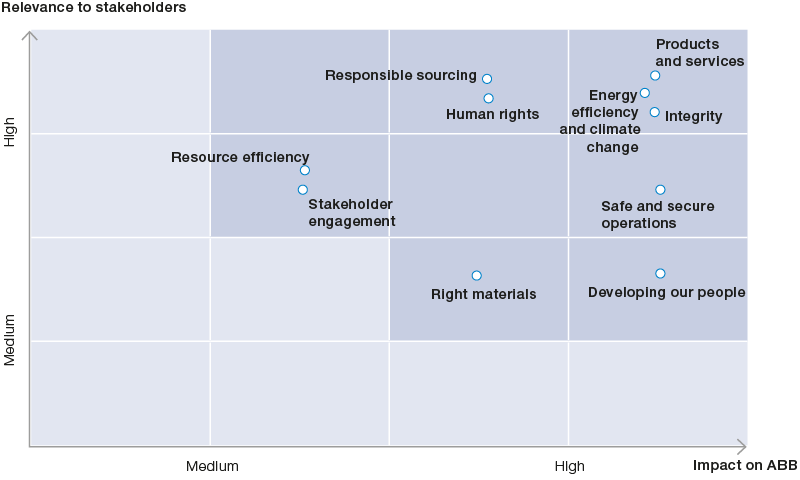Material issues
Material issues
We have undertaken considerable work in recent years to understand what internal and external stakeholders expect of ABB’s sustainability performance and where we should focus our strategy and improvement goals.
In 2011 we fundamentally reassessed our material issues, using input from nearly 600 people, including senior ABB executives and employees from all parts of the business, customers, and external stakeholders specialized in key sustainability areas. We also mapped regulatory risks and macro trends, and benchmarked against peer companies to help us establish a comprehensive sustainability issues landscape. The resulting materiality matrix then shaped the development of our sustainability strategy during 2011.
We undertook further reviews with a smaller selection of stakeholders in 2013 and in 2014 to update our assessment of material aspects and to seek their views on how best to report on our sustainability strategy, performance and progress. These reviews were conducted by a third party who interviewed representatives across our key constituencies: ABB employees, customers, suppliers, investors, civil society, including NGOs, international organizations, sustainability experts and young people.
The results from the interviews confirmed the main conclusions from our 2011 consultation. Overall, stakeholders found that the materiality matrix provided a good snapshot of relevant issues for ABB, but did request clear definitions of the specific topics considered within each material issue, which we have since developed and published.
These stakeholder consultations have helped us to develop and further refine our Sustainability Objectives 2014–2020.
Evolution of the consultation process: stakeholder panel
The third-party interview process has enabled us to obtain the views of a broad selection of stakeholders in a relatively efficient way and the feedback received has been extremely valuable. However, the one-way flow of information has not allowed for clarifying conversations – either for the stakeholders or for ABB – nor has it allowed for exchanges of views on broader topics. We felt that this was a lost opportunity.
In order to continue and enrich our stakeholder consultation process, we set up a sustainability report review panel in 2015 to replace the third-party stakeholder interviews. The panel’s objective is to challenge the company’s approach to sustainable development, review the most material issues and form an opinion on the company’s sustainable development performance and reporting.
Panel members represent the key market and non-market stakeholders of the company and were selected for their level of knowledge and skills regarding sustainable development issues relevant to the company. We sought to achieve both geographical and gender balance, as far as was possible. Three of the eight panel members have participated in stakeholder interviews in previous years.
Panel members have met with senior executives of ABB twice during the preparation of the ABB Sustainability Performance Report 2015. Meetings were held virtually and chaired by an external facilitator. The majority of panel members joined these meetings and those unable to participate were interviewed separately at a later date.
During the initial meeting in October 2015, we received extensive feedback on ABB’s Sustainability Objectives, along with commentary on ABB’s 2014 sustainability reporting and online sustainability presence. The panel also reviewed the draft outline of the 2015 report and provided input regarding material issues.
The panel’s recommendations covered both longer term issues, such as adjustments to objectives, targets and KPIs, and more immediate issues such as content and narrative in the sustainability report and material issues.
These stakeholder views have helped to determine the structure and content of this report. We also updated our materiality matrix accordingly and will work to address the longer term issues starting in 2016.
The panel’s consensus statement appears later in the report and we will describe our response to the panel’s recommendations in our next sustainability report.
We will continue to review these issues annually with our stakeholder panel and will use this input to inform our improvement goals and programs, as well as our reporting activities.
Sustainable Development Goals
ABB welcomes the adoption of the UN Sustainability Development Goals (SDGs), believing they provide a framework for tackling a number of core economic, social and environmental challenges in the coming years. ABB’s business focus on utilities, industry, infrastructure and transportation correspond to several of the improvement areas prioritized in the SDGs.
Our resource-efficient products and services, and our focus on strengthening access to reliable and renewable sources of energy, mean the company is well placed to contribute to some of the key aims highlighted in the SDGs. In addition, our product offerings and programs to foster social progress are aligned with some of the key SDG to increase inclusiveness, and strengthen education and healthcare.
We have conducted a first analysis of where ABB believes it can support the realization of the SDGs. During 2016 we will start to work on integrating activities to support the SDGs into our sustainability objectives and roadmaps.
2015 materiality matrix
Mouse over the image to see the definitions of each material issue.
